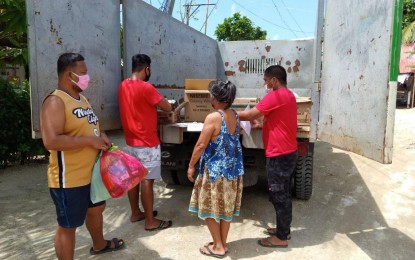
PLASTIC IN EXCHANGE OF FOOD. A rolling store that collects clean and dry plastic waste in exchange of food items in Arteche, Eastern Samar. Two local government units in Samar provinces have been urging its residents to collect plastic waste in exchange for food. (Photo courtesy of Arteche local government)
TACLOBAN CITY – Two local government units in Samar provinces have been urging their residents to collect plastic waste in exchange for food packs.
In Arteche, a third-class town in Eastern Samar, the local government unit has been implementing 3Ts or tirok (collect), timbang (weigh), tabang (help).
Residents are encouraged to collect and clean single-use plastics such as junk food packs, plastic bags, and empty sachets and keep it in a clean bag or sack.
Residents must clean the single-use plastic before they have it weighed by the designated collector -- a rolling store that roams around the town every Thursday.
Names of residents and the corresponding weight of collected plastic will be listed in a ledger that is signed by the solid waste management officer.
“At the last Thursday of the month, the 3Ts rolling store will again visit (the) village bringing basic goods such as sugar, rice, canned goods, and other goods that are essentials in every household,” Mayor Roland Boie Evardone said in an interview Monday.
The number of food packs depends on the volume of plastic waste collected. Each kilogram of clean and dry single-use plastic is worth PHP10.
In the second-class town of Paranas, Samar, Mayor Eunice Babalcon has been urging residents to collect plastic and turn them into eco-bricks.
An eco-brick is a Pet bottle packed solid with clean and dry used plastic made to a set density to create reusable building blocks and can be used to make modular units, furniture, and earthen gardens and structures.
The local government exchanges the eco-bricks with food packs.
Babalcon said it is part of their health crisis intervention and at the same time an effort of the town to continue its campaign to curb malnutrition.
A kilogram of eco-bricks is equivalent to the same weight of rice and assorted vegetables.
Paranas town has an existing ordinance prohibiting and regulating the use of plastics for goods and commodities that end up as residual waste and promote the use of eco-bags and other environment-friendly practices as an alternative. (PNA)
